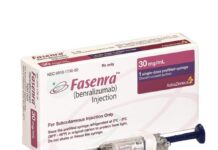LYON, France– POXEL SA (Euronext – POXEL – FR0012432516), a clinical stage biopharmaceutical company developing innovative treatments for chronic diseases with metabolic pathophysiology, including non-alcoholic steatohepatitis (NASH) and rare disorders, today announced the completion of enrollment in DESTINY-1 (Deuterium-stabilized R-pioglitazone (PXL065) Efficacy and Safety Trial In NASH), a dose-ranging Phase 2 trial evaluating PXL065 for the treatment of NASH. PXL065 is a novel, proprietary deuterium-stabilized R-stereoisomer of pioglitazone. DESTINY-1 enrolled 123 noncirrhotic biopsy-proven NASH patients across multiple clinical sites in the US in a 36-week, randomized, dose-ranging, double-blind, placebo-controlled, parallel group study designed to assess the efficacy and safety of PXL065. The primary endpoint of the study will measure the relative change in the percentage of liver fat content based on magnetic resonance imaging-estimated proton density fat fraction (MRI-PDFF). The study will also assess the effects of PXL065 on liver histology and other metabolic and non-metabolic biomarkers. Results from the Phase 2 study are anticipated in Q3 2022.
“Pioglitazone – and other thiazolidinedione drugs – exert both genomic (PPARγ) and non-genomic actions. PXL065, the deuterium-stabilized single R-stereoisomer of pioglitazone, has been shown to selectively mediate non-genomic effects of pioglitazone that can ameliorate key components of NASH pathophysiology including steatosis, inflammation and fibrosis. This preclinical profile provides for potential benefits in NASH but with an improved side effect profile with respect to PPARγ – mediated body weight gain and edema,” said David E. Moller, MD, EVP and CSO of Poxel.
“In our Phase 1 development program, we first confirmed that PXL065 was safe and well-tolerated, and that substantially greater relative exposure to the preferred (low PPARγ) – R-stereoisomer was achieved. By leveraging the 505(b)(2) regulatory path and with input from several top NASH advisors, DESTINY-1 was designed as a streamlined approach to validate that the efficacy of PXL065 in NASH is aligned with that established with pioglitazone. Results from this trial should allow us to select one (or potentially two) doses that could then be studied in a confirmatory pivotal trial,” said Pascale Fouqueray, MD, PhD, Executive Vice President, Clinical Development and Regulatory Affairs at Poxel.
Stephen Harrison, MD, President, Summit Clinical Research, further commented: “Pioglitazone has a strong track record of efficacy in NASH with more than 5 trials showing substantial benefits on liver histology that match or exceed most contemporary efficacy results obtained with other oral molecules. Thus, testing the hypothesis behind DESTINY-1 is a worthy objective. As the principal investigator of this important trial, I am very excited to see that we will be positioned to receive results next year.”






